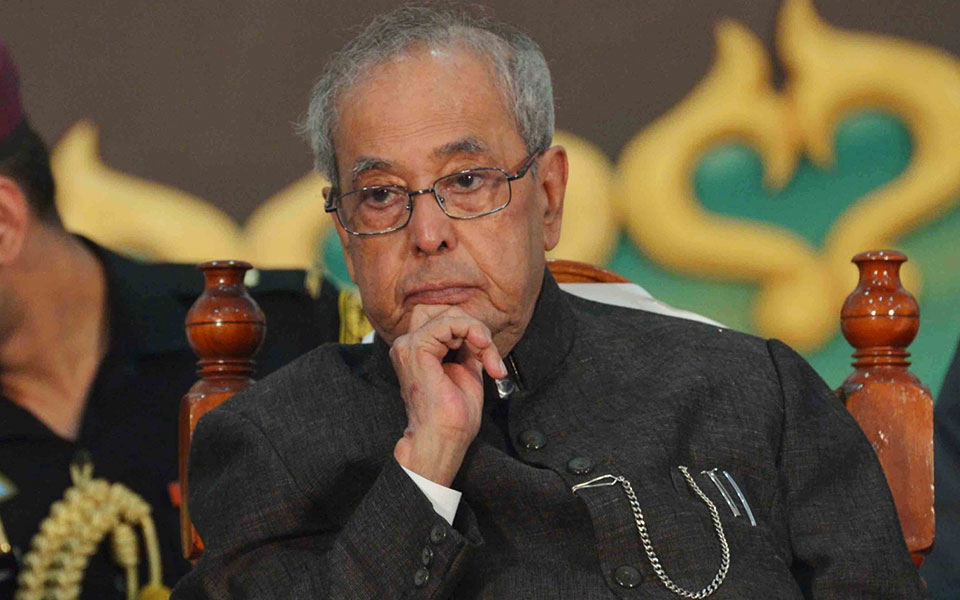Nagpur, June 6: As the country wonders what former President Pranab Mukherjee might say at Rashtriya Swayamsevak Sangh (RSS) headquarters here on Thursday, his last speech as President in 2017 reflects the thoughts and concerns that had engaged him throughout his over five-decade-long political career.
Unlike his 2012 speech when he took over as President in which he made a passing reference, pluralism and tolerance dominated the 2017 address.
"I want to share with you some truths that I have internalized in this period. The soul of India resides in pluralism and tolerance. India is not just a geographical entity. It carries a history of ideas, philosophy, intellect, industrial genius, craft, innovation and experience. Plurality of our society has come about through assimilation of ideas over centuries.
"The multiplicity in culture, faith and language is what makes India special. We derive our strength from tolerance. It has been part of our collective consciousness for centuries. There are divergent strands in public discourse. We may argue, we may agree or we may not agree.
"But we cannot deny the essential prevalence of multiplicity of opinion. Otherwise, a fundamental character of our thought process will wither away," said the lifelong Congressman on the last day of his career.
Mukherjee, who has been critical of the RSS, is set to address its activists in Nagpur on Thursday. This will be his first speech from the RSS platform.
Accepting an invitation from the Hindutva group has sparked controversy with some of his former Congress colleagues and Left leaders expressing their reservations over his participation in the RSS meeting.
However, what he is going to speak about at the Nagpur gathering remains a guess. He has said whatever he has to speak would be only known when he addresses the meeting.
In his last speech as the President, Mukherjee had expressd his concern about increasing violence and how darkness, fear and mistrust was at the heart of this violence. Power of non-violence has to be resurrected to build a caring society to ensure participation of all sections of the people, he said.
While pluralism along with environment and inclusion engaged Mukherjee last year as he readied to hang up his boots after a very successful career, his first speech as President in 2012 was markedly different and focussed mainly on poverty, terrorism and corruption. He talked on education both the times.
The first topic Mukherjee touched in his 2012 speech was poverty after making the same overarching statement on basic fundamentals for a modern nation - democracy, secularism and equality. Real development is when the poorest feel they are part of the narrative of rising India, he said.
"There is no humiliation more abusive than hunger. Trickle-down theories do not address the legitimate aspirations of the poor. We must lift those at the bottom so that poverty is erased from the dictionary of modern India."
However, then, too, Mukherjee's faith in secularism is reflected in the solitary line on the topic when he said: "Our social harmony is the sublime co-existence of temple, mosque, church, gurudwara and synagogue; they are symbols of our unity in diversity."
Let the Truth be known. If you read VB and like VB, please be a VB Supporter and Help us deliver the Truth to one and all.
Hyderabad (PTI): Telangana Chief Minister A Revanth Reddy met Union Home Minister Amit Shah in Delhi on Wednesday night and urged him to increase the sanctioned strength of IPS officers to the state in view of its growing administrative and security needs.
The two leaders also discussed the recent surrender of several senior Maoist leaders before the Telangana Police and other issues.
"During the meeting, the two leaders discussed the issue of Maoist surrenders and their rehabilitation. The chief minister informed Shah that significant improvements in policing have taken place in Telangana over the past two years," an official release here said.
Highlighting that 591 Maoists have laid down their arms and joined the mainstream of society during this period, the chief minister said the state government was providing them compensation and rehabilitation assistance as per the rules.
He requested the Union home minister to extend financial support from the central government for development works in the backward regions of the state.
Reddy also urged Shah to increase the sanctioned strength of IPS officers to the state from 83 to 105 in line with the state's growing administrative and security needs, the statement said.
The first cadre review after the formation of Telangana was conducted in 2016, while the next review, due in 2021, was delayed and finally carried out in 2025. Even then, only seven additional IPS officers were allocated to the state, the chief minister informed Shah and requested that the third cadre review be conducted in 2026 as per the schedule.
Reddy explained that Telangana, like the rest of the country, is facing several modern challenges, including cybercrime, drug trafficking, white-collar crimes, and other emerging security threats.
He highlighted the reorganisation of the Hyderabad, Cyberabad, and Malkajgiri Police Commissionerates, the proposed formation of the Future City Commissionerate and the rapidly growing population in Hyderabad to underline the increasing administrative requirements of the state.





